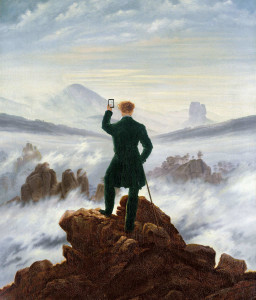8 August 2018 (Balos Bay, Crete, Greece) — Every summer my wife and I take four to five weeks off and return home to Greece to rest, recharge, recalibrate, and re-energize ourselves for the months ahead, and whatever they may bring us. For my wife, fall and winter are her busiest work periods. For me, it’s “big think” time after covering (this year) 18 conferences and workshops, but this summer it also means planning my semi-retirement as I hand over the keys to my companies to staffers and family (“The Next Generation”) so I can focus on several documentaries I am producing. Plus my wife and I spend time on our big passion, participating in one of the many ARCHELON projects to save sea turtles.
Greece is what you expect the earth to look like if it was given a fair chance. It is not mysterious or impenetrable, but it is awesome, made of earth, air, fire and water. Yes, it changes seasonally with harmonious undulating rhythms. It breathes. Here you can get a bit nearer to the stars and the ether.
Night sky over my house shot by photog friend Panos Euripiotis
You awake and just start your day without consulting the sky … or the weather app on your phone 🙂 You enjoy the sublimity of silence, the revelation of light. Quiet. Solitiude. Blue sky … marked at the waterline with huge, frenzied pillars of stone, scarred by wind and lightning. A topography that belongs to no time or place, allowing you to escape the substance and weight of the modern world. I believe that this silence can be fertilizing, that it can bathe the imagination.
And this escape also follows the advice given to me long, long ago by my first guru, Dominique Senequier (she now heads Axa Private Equity in France), who told me the trick to happiness and personal success is to be committed to all aspects of your life, and find time to disconnect every once and awhile. Otherwise “we are like fish who do not know they swim in water, and are seldom aware of the atmosphere of the times through which they move”.
The breathtaking advance of scientific discovery and technology has the unknown on the run. Not so long ago, the Creation was 8,000 years old and Heaven hovered a few thousand miles above our heads. Now Earth is 4.5 billion years old and the observable Universe spans 92 billion light years. But I think as we are hurled headlong into this frenetic pace we suffer from illusions of understanding, a false sense of comprehension, failing to see the looming chasm between what our brain knows and what our mind is capable of accessing. It’s a problem, of course. Science has spawned a proliferation of technology that has dramatically infiltrated all aspects of modern life. In many ways the world is becoming so dynamic and complex that technological capabilities are overwhelming human capabilities to optimally interact with and leverage those technologies.
Still, there is hope. As society has grown more conspicuously frantic and restless, there is increasing appreciation of the various modes of doing less. As attested to by the explosion of coffee shops, the expansion of the leisure industry, and even the opening of bespoke stores stocking only paper-printed magazines, we’re realizing that you’ve simply got to make an effort … to do nothing.
But I think we also owe it to ourselves to step back at some point every year and do “big thinks”. This is partly because we live via pieces: shards, ostraca, palimpsests, sometimes crumbling codices with missing pages. But mostly we live on a barrage of news clips from CNN, Facebook, LinkedIn, Twitter, and [“name-your-social-media-blaster”]. We have created an environment which rewards simplicity and shortness, which punishes complexity and depth. Yes, we may never know more than part, as “through a glass darkly”, and all knowledge comes to us in pieces, but we do owe ourselves “big think” time. This summer I intend to spend time examining the following three topics or themes. Granted, each deserves a summer in itself but they do overlap considerably:
- 1. Why Trump seems to have triumphed over the space-time continuum. That has created massive problems for newsrooms and was heavily discussed at the International Journalism Festival in Perugia, Italy. But all of this has been exacerbated by forces that predate Trump: the rise of Facebook and Twitter, the partisan instincts of cable news, and massive “news fatigue”. If you look at the detrimental developments in America’s recent public discourse you cannot help but look at the pathetic state of the U.S. education system and its woefully inadequate history education. America’s schools breed adults who tend to conflate empirical fact and opinion, and who lack the media literacy necessary to navigate conflicting information.
Worse, there was once a time when the people who think about such things lamented the rise of information silos and filter bubbles and echo chambers: the newfound ability for people to choose their own adventures when it comes to the types of information they consume. Those concerns remain but are somewhat quaint. To me, competing truths – “alternative facts” – are no longer the primary threat to American culture: competing lies are. Everything was possible and nothing was true. Conspiracies now smirk and smog in the air, issued from the giant smokestacks at InfoWars and the White House itself. But oh, just look at history. Hannah Arendt warned us that mass cynicism can befall cultures when propaganda is allowed to proliferate among them; that cynicism is here … now. And it is accompanied by something just as destructive: a sense of pervasive despair. Americans live in a world of information pollution – and the subsequent tragedy of this new environmental reality is that no one has been able to figure out a reliable method of clearing the air.
- 2. In my e-discovery wanderings, two things:
- Though my e-discovery unit only does “extreme e-discovery” (I will have a post this fall on a project we completed in Libya), I want to spend time looking at the explosion in the use of standard e-discovery document review platforms in “data journalism” plus social media analytics, which I first discussed last year in this blog post, as did Jonathan Maas in this blog post. Most recently, FiveThirtyEight released a directory of nearly 3 million tweets sent from Twitter handles connected to the Internet Research Agency, a Russian “troll factory” and a defendant in an indictment filed by the U.S. Justice Department as part of special counsel Robert Mueller’s Russia investigation. Using standard e-discovery software, we can do amazing analytics on those Tweets.
- As I noted in a post earlier this week, Google has 2,500+ staffers dealing with the GDPR, and Facebook has 2,000+. Both have been meeting with regulators for informal talks. Overall, it seems like Facebook is complying with the letter of GDPR law … but perhaps with a questionable spirit. Sure, privacy is boring to a lot of people. Too little info and they feel confused and scared. Too many choices and screens and they feel overwhelmed and annoyed. Facebook probably struck the right balance in some places. But the subtle “pushy” designs seem intended to make people race through consent and steer people away from changing their defaults in ways that could hamper Facebook’s mission and business. [NOTE: to Max Schrems it’s “forced consent”, a take-it-or-leave-it situation. After reading the four complaints he has filed on behalf of (unnamed) individual users, his position seems to be that this strategy of “forced consent” allows these companies to continue processing the individuals’ personal data when in fact the law requires that users be given a free choice unless a consent is strictly necessary for provision of the service.]
For e-discovery/compliance vendors, I hear a common refrain. The constant based on my chats with 12 of them: “Few companies are going to pony up for GDPR governance or Privacy by Design until some fines are handed out”. Which echos a comment Jonathan Maas made at Relativity Fest in London a year or two ago: “GDPR should be the kick up the arse information governance needs. But frankly if they have done nothing with IG it is most likely they are not going to do anything with GDPR. Unless these fines everybody is hawking are realized”. And regulators remain woefully understaffed. One Ireland-based compliance vendor told me the Irish data protection officer needs 20+ GDPR people .. and cannot find them.
But there is a much bigger issue. From its earliest days, Silicon Valley has been animated by near-absolutist understanding of free speech. Other than exceptions for fraud, pornography or specific threats, the prevailing view among many tech platforms has been to allow pretty much anyone to post pretty much anything. But now, for good reason, the absolutist ethos is over. Tech platforms have begun to radically overhaul their attitudes about what people can say online and how they can say it. They are actively controlling content. This is a huge deal. Because they are now so influential and so deeply embedded in our lives, a more hands-on approach to policing content will ripple around the world, altering politics, the media business and much else in society. And that will dwarf the GDPR and its maze of petty regulations which are merely accessory to the real revolution.
- 3. What’s really happening with AI and machine learning. With the onslaught of artificial intelligence we seem to have launched into a state where we assume that intelligence is somehow the teleological endpoint of evolution – incredibly anthropocentric, and pretty much wrong along every conceivable axis. Intelligence is an evolutionary response to a particular context and set of survival challenges. Frankly, I am pretty impressed with the development of flight, speed, fertility, or resilience to radiation. No slackers, they. So I am rewatching all of the presentations from the Nips (Neural Information Processing Systems) conference, the huge annual gathering of machine learning experts. At last year’s event (held every September) Ali Rahimi, one of the field’s acknowledged stars, lobbed an intellectual grenade into the audience. In a remarkable lecture he likened ML to medieval alchemy. Both fields worked to a certain extent – alchemists discovered metallurgy and glass-making; ML researchers have built machines that can beat human Go champions and identify objects from pictures. But just as alchemy lacked a scientific basis, so, argued Rahimi, does ML. Researchers, he claimed, often can’t explain the inner workings of their mathematical models: they lack rigorous theoretical understandings of their tools and in that sense are currently operating in alchemical rather than scientific mode.
And we talk about AI that will extend meaning in the universe that gave life to us. But for AI to do that it must, itself, understand and experience “meaning”, and there is no real evidence of how it might develop this capability. Besides, we have already constructed an omniscient, omnipotent, deathless AI that holds all of our fates in its power: it’s called God. It took millennia for us to build and shape it into something that extends meaning in our universe. It has caused wars and dictated peace, has won fierce allegiance, and can’t be (or hasn’t yet been) turned off. It is instantiated in works that for centuries have absorbed the thought, labor, and substance of humankind. We who are not members of the new clerisy are now waiting to see if the AI we fear displaces the AI we have.
DIGITAL DETOX?
Above based on “Wanderer Above the Sea of Fog”
by Caspar David Friedrich (1818)
Apologies to the artist. It was just too good not to meme.
Yes, it is mildly subversive and perhaps a little quaint when someone clings to their flip phone and refuses a smartphone. Refusing both kinds of phones is viewed as downright lunacy, especially if the person refusing was born after the mid-1970s. But when I retire to my home in Greece every summer for my “Greg time” I do eschew my smartphone and use just a feature phone (Nokia 3310) to stay in touch with family. I do not want the omnipresent ability to communicate with anyone who is absent. Smartphones put their users constantly on call, constantly available, and as much as that can be liberating or convenient, it can also be an overwhelming burden when you want to stay focused on a complex task. The burden comes in the form of feeling an obligation to individuals and events that are physically elsewhere.
Several summers ago I had put my foot down and yelled “No internet. I want to have REAL conversations face-to-face about life!!” My wife’s response (a woman who always delights in putting me in my place) quietly responded: “Wow. Then I must be extraordinary. I can have REAL conversations with or without WiFi, or even with or without 3G. Why, even with or without 4G!”
I do “check things” but via laptop and on a very strict schedule set by She-Who-Must-Be-Obeyed. I do feel one must rescind one’s smartphone use for the duration of a break in order to maintain one’s equilibrium. Yes, where once we had Fomo (fear of missing out), today’s buzzword is Jomo (the joy of missing out), and the sense of liberation that comes with disconnecting and putting down our phones.
No, I do not leave out-of-office messages (I have the supreme advantage of a 10-person staff to handle things) though I do love the idea that anyone can think themselves so monstrously important they would need to tell people that they will no longer be online. My favorite out-of-office message this summer comes from a British friend:
The UK is currently out of the European Union. I will have no access to legislation or the Commission during this time. For urgent queries please contact Theresa at number ten or Elizabeth at the Buckingham Office. I will have intermittent access to freedom of movement and will still need to pay some tax so I will be around if you need me but with delayed replies. I may get back to you on my return since it’s not yet totally ruled out.
I trust you all have an opportunity for some lengthy summertime fun … and maybe time for a “big think” or two. Enjoy. I leave you with Mary Oliver, an American poet and my next-door neighbor when I lived in Provincetown, Massachusetts. More about her here.



